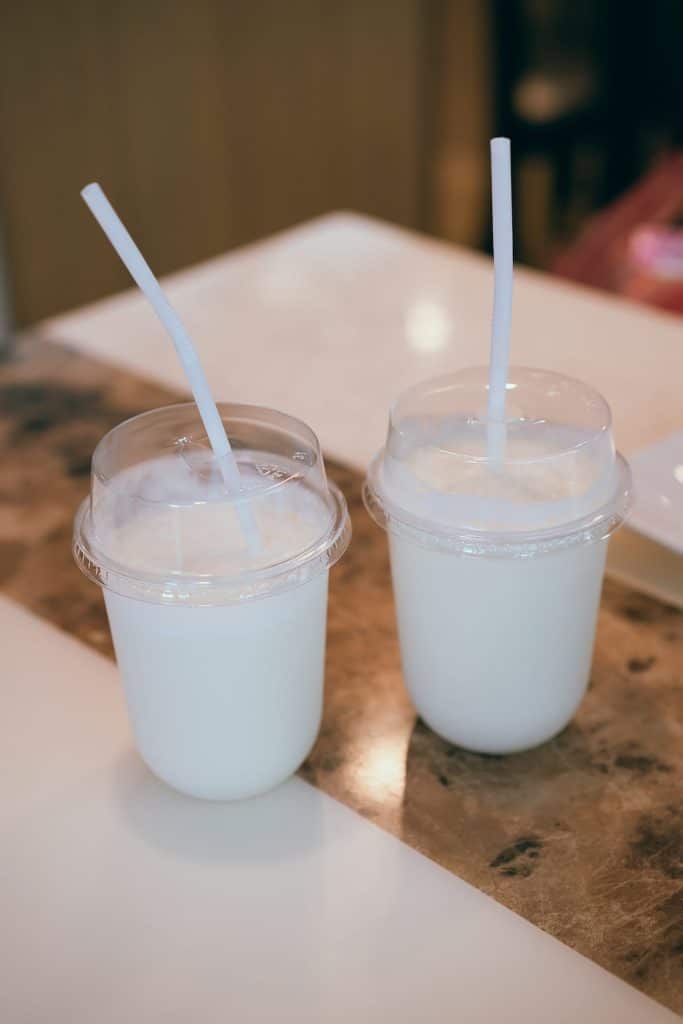Introduction
Buttermilk is a fermented dairy product that is made by adding lactic acid bacteria to milk, causing it to ferment and thicken. Traditionally, buttermilk was the liquid left over after churning butter from cream. However, nowadays, buttermilk is usually made by adding bacteria to skim or low-fat milk, creating a sour, tangy flavor that makes it popular in cooking and baking. You might be looking for the answer to the question: is buttermilk a keto-friendly option or not? Read on.

Types of buttermilk
There are two types of buttermilk: traditional and cultured.
- Traditional buttermilk is the liquid that remains after churning cream to make butter. It has a thin consistency and a tangy, sour flavor. It is not widely available, as it is a byproduct of butter-making and is often difficult to find in supermarkets.
- Cultured buttermilk is the type of buttermilk that is most commonly found in stores. It is made by adding lactic acid bacteria to milk and allowing it to ferment, creating a thick and tangy product. Cultured buttermilk is often low-fat or skim, and may be labeled as “cultured low-fat buttermilk” or “cultured skim buttermilk.”
Nutritional information of Buttermilk
Buttermilk is a nutrient-dense food that is rich in protein, vitamins, and minerals. A typical serving of buttermilk (1 cup or 245 grams) contains:
- Calories: 98
- Fat: 2.2 grams
- Carbohydrates: 12.3 grams
- Protein: 8.1 grams
- Calcium: 285 milligrams (28% of the recommended daily intake)
- Vitamin B12: 1.1 micrograms (46% of the recommended daily intake)
- Riboflavin (Vitamin B2): 0.4 milligrams (29% of the recommended daily intake)
It is important to note that buttermilk may contain added sugars or other additives, so it is important to read the nutrition label carefully when purchasing it. Additionally, buttermilk is not suitable for individuals who are lactose intolerant or have a dairy allergy.
Is buttermilk Keto Friendly?

A. Overview of the ketogenic diet
The ketogenic diet is a high-fat, moderate-protein, and low-carbohydrate diet that aims to induce a state of ketosis in the body. In this metabolic state, the body burns fat for fuel instead of carbohydrates. To achieve and maintain ketosis, individuals on a ketogenic diet typically limit their carbohydrate intake to 20-50 grams per day.
B. Carbohydrate content of buttermilk
While buttermilk is a dairy product, it does contain a significant amount of carbohydrates. One cup (245 grams) of buttermilk typically contains around 12.3 grams of carbohydrates. This may not seem like a lot, but for individuals on a strict ketogenic diet, it can be challenging to fit buttermilk into their daily carbohydrate limit.
C. Fat content of buttermilk
While buttermilk is not particularly high in fat, it does contain some fat, which can be beneficial for those on a ketogenic diet. One cup of buttermilk typically contains around 2.2 grams of fat. However, individuals on a ketogenic diet typically aim to consume high amounts of healthy fats to support ketosis, so buttermilk may not be the most efficient way to consume fats.
D. Protein content of buttermilk
Buttermilk is a good source of protein, with one cup typically containing around 8.1 grams. Protein is an important macronutrient for those on a ketogenic diet, as it helps to maintain muscle mass and support overall health.
E. Comparison of buttermilk with other dairy products
Compared to other dairy products, buttermilk is relatively low in fat and calories. However, it is higher in carbohydrates than some other keto-friendly dairy products, such as heavy cream or full-fat Greek yogurt. When compared to regular milk, buttermilk is lower in fat and calories but contains slightly more carbohydrates.
F. Potential benefits of consuming buttermilk on a keto diet
Buttermilk contains beneficial nutrients such as calcium and vitamin B12, which can be difficult to obtain on a low-carbohydrate diet. Additionally, the protein in buttermilk can help to support muscle growth and repair. However, due to its carbohydrate content, buttermilk may need to be consumed in moderation on a ketogenic diet. It is also important to choose plain, unsweetened buttermilk, as sweetened or flavored varieties may contain added sugars and carbohydrates that could push an individual over their daily carbohydrate limit.
How to incorporate Buttermilk into a keto diet
A. Serving size and portion control
When incorporating buttermilk into a ketogenic diet, it is important to be mindful of portion control. As previously mentioned, one cup of buttermilk contains around 12.3 grams of carbohydrates. This may not seem like a lot, but for those on a strict ketogenic diet, it can be challenging to fit buttermilk into their daily carbohydrate limit. A smaller serving size, such as half a cup, can be a better option for those looking to incorporate buttermilk into their keto diet without exceeding their daily carbohydrate limit.
B. Ways to use buttermilk in keto-friendly recipes
Buttermilk can be used in a variety of keto-friendly recipes, such as low-carb pancakes or biscuits. When used in recipes, it is important to choose recipes that are specifically designed to be low in carbohydrates. This can ensure that the recipe fits within an individual’s daily carbohydrate limit while still providing the flavor and nutritional benefits of buttermilk.
C. Suggestions for pairing buttermilk with other keto-friendly foods
Pairing buttermilk with other keto-friendly foods can help to balance out its carbohydrate content while providing a balanced meal. Some keto-friendly foods that pair well with buttermilk include:
- Berries: Fresh berries such as strawberries or blueberries are low in carbohydrates and pair well with buttermilk in a smoothie or breakfast bowl.
- Nuts and seeds: Adding nuts or seeds to a bowl of buttermilk and berries can provide a source of healthy fats and fiber while balancing out the carbohydrate content.
- Low-carb vegetables: Pairing buttermilk with low-carb vegetables such as spinach or kale can create a flavorful and nutrient-dense salad.
- Keto-friendly sweeteners: If using buttermilk in a recipe that requires a sweetener, it is important to choose a keto-friendly sweetener such as stevia or erythritol to keep the carbohydrate content low.
In summary, incorporating buttermilk into a ketogenic diet can provide beneficial nutrients such as calcium and vitamin B12 while supporting muscle growth and repair with its protein content. It is important to be mindful of portion control and to choose keto-friendly recipes and pairings to stay within daily carbohydrate limits.
Alternatives to buttermilk on a keto diet
A. Overview of alternative dairy products
For those on a ketogenic diet who wish to avoid or limit their intake of buttermilk, there are a number of alternative dairy products that can be used in its place. Some common options include:
- Heavy cream: A high-fat, low-carbohydrate dairy product that can be used in place of buttermilk in recipes.
- Sour cream: A tangy, creamy dairy product that can be used in place of buttermilk in recipes or as a topping for dishes such as baked potatoes or chili.
- Cream cheese: A high-fat, low-carbohydrate dairy product that can be used in place of buttermilk in recipes or as a spread for low-carb breads and crackers.
- Greek yogurt: A high-protein dairy product that can be used in place of buttermilk in recipes or as a topping for dishes such as chili or tacos.
B. Comparison of alternative dairy products with buttermilk
When comparing alternative dairy products to buttermilk, it is important to consider their macronutrient content. For example, heavy cream is higher in fat and lower in carbohydrates than buttermilk, while Greek yogurt is higher in protein and lower in fat. Depending on an individual’s nutritional needs and preferences, they may choose to use one of these alternatives in place of buttermilk.
C. Non-dairy options for replacing buttermilk
For those on a ketogenic diet who prefer to avoid dairy altogether, there are a number of non-dairy options for replacing buttermilk in recipes. Some common options include:
- Almond milk: A low-carbohydrate, non-dairy milk that can be used in place of buttermilk in recipes.
- Coconut milk: A high-fat, low-carbohydrate milk that can be used in place of buttermilk in recipes or as a base for smoothies.
- Soy milk: A low-carbohydrate, high-protein milk that can be used in place of buttermilk in recipes.
- Nut-based yogurts: Non-dairy yogurts made from nuts such as almonds or cashews can be used in place of buttermilk in recipes or as a topping for dishes such as chili or tacos.
When using non-dairy alternatives, it is important to choose unsweetened varieties to keep the carbohydrate content low. It may also be necessary to adjust the amount of liquid used in recipes to achieve the desired consistency.
Net Carb Calculator for buttermilk
To calculate the net carbs in buttermilk, you will need to know the total carbohydrate content and fiber content. Here is an example of how to calculate the net carbs in 1 cup of buttermilk:
- Check the nutrition label on the buttermilk container to find the total carbohydrates per serving. Let’s assume it is 12 grams.
- Check the nutrition label to find the fiber content per serving. Let’s assume it is 0 grams.
- Subtract the fiber from the total carbohydrates to find the net carbs:
- Net Carbs = Total Carbs – Fiber
= 12 grams – 0 grams
= 12 grams
Therefore, 1 cup of buttermilk contains 12 grams of net carbs.
It is important to note that the net carb content of buttermilk may vary depending on the brand and type of buttermilk, so it is always recommended to check the nutrition label and calculate the net carbs accordingly. Additionally, it is recommended to consume buttermilk in moderation and consider its net carb content when planning meals on a ketogenic diet.
Conclusion
Based on the nutritional information discussed in this article, it can be concluded that buttermilk is generally keto-friendly, with a moderate amount of carbohydrates and a low-to-moderate amount of fat and protein. However, it is important to consider serving size and portion control, as well as the overall macronutrient content of one’s diet when incorporating buttermilk.
For those looking to incorporate buttermilk into their keto diet, it is recommended to use it in moderation and consider its carbohydrate content when planning meals. Some ways to use buttermilk in keto-friendly recipes include adding it to low-carb pancakes or waffles, using it as a marinade for chicken or pork, or incorporating it into a salad dressing.
It is also important to consider alternative dairy and non-dairy options, as there are many options available that can be used in place of buttermilk while still meeting the macronutrient requirements of a ketogenic diet.
Frequently Asked Questions
Q: How many carbs does buttermilk have?
A: The carbohydrate content of buttermilk can vary depending on the brand and type, but on average, one cup of buttermilk contains around 12 grams of carbohydrates, with no fiber.
Q: Is buttermilk high in fat?
A: Buttermilk is not particularly high in fat compared to other dairy products, such as heavy cream or cream cheese. One cup of buttermilk typically contains around 2 grams of fat.
Q: Can I drink buttermilk on a keto diet?
A: Yes, buttermilk can be consumed on a keto diet in moderation, as it contains a moderate amount of carbohydrates. It is important to consider serving size and portion control when incorporating buttermilk into your diet.
Q: Are there any keto-friendly alternatives to buttermilk?
A: Yes, there are several keto-friendly alternatives to buttermilk, including heavy cream, sour cream, cream cheese, and almond milk. These alternatives can be used in place of buttermilk in recipes or as a substitute for drinking buttermilk.
Q: What are some keto-friendly recipes that use buttermilk?
A: Some keto-friendly recipes that use buttermilk include low-carb pancakes or waffles, keto biscuits, and buttermilk ranch dressing. These recipes typically use a moderate amount of buttermilk and are designed to fit within the macronutrient requirements of a keto diet.

Meet Yasir here! As a blogger for over six years, my passion has never faded. I love writing in a variety of niches including weight loss and Keto Diet. I am an enthusiastic blogger and writing geek. I am known for honest product reviews and am always looking for the latest and greatest technology. I have been blogging for over six years, and my articles are featured on some of the top websites. When I am not writing, I spend time with my family or working on my next big project. Cheers!








